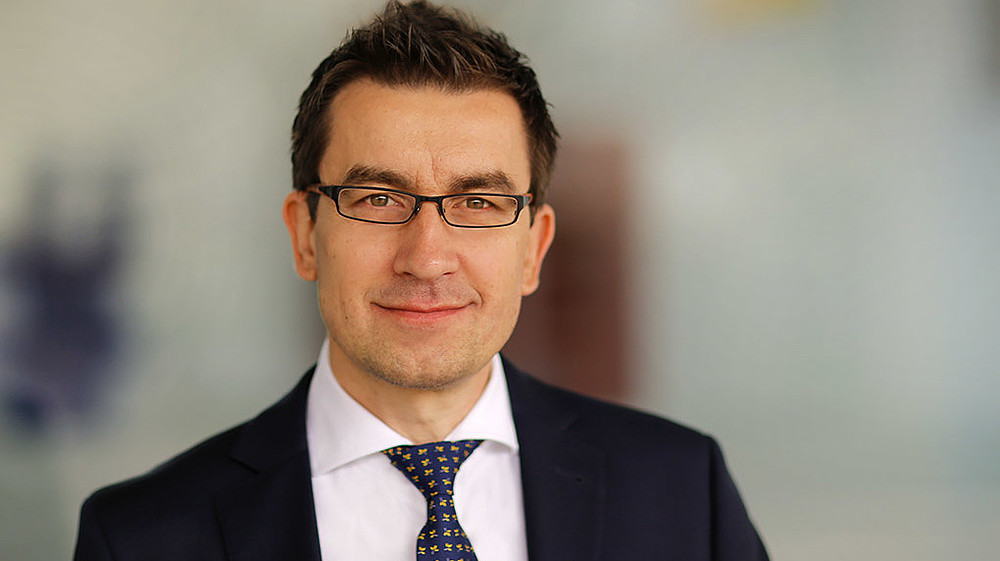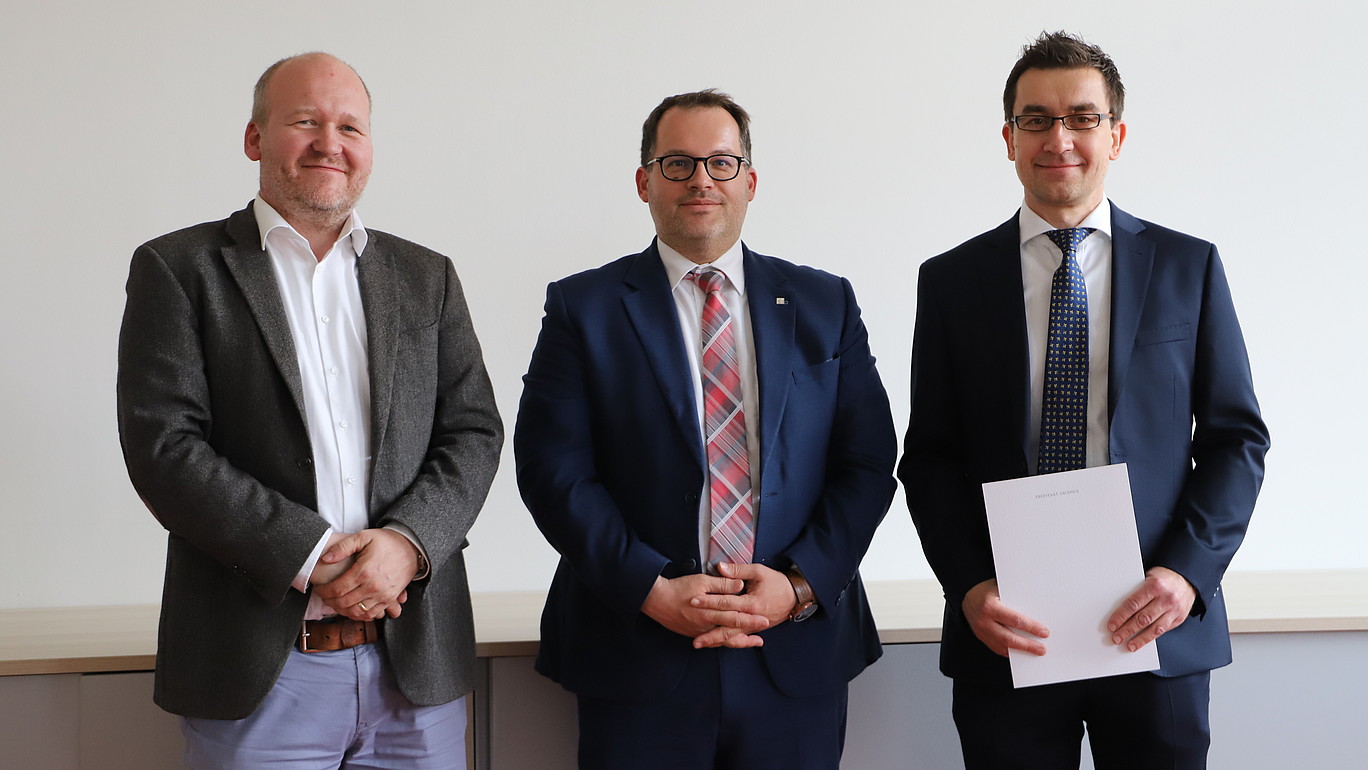In this interview, Prof. Dr.-Ing. Cezary Dzienis talks about his field of appointment and how he has been approaching teaching at the HSZG since January 2022.

Prof. Dr.-Ing. Cezary Dzienis has been Professor of Grid Protection Technology/Intelligent Grid Management at the Faculty of Electrical Engineering and Computer Science at Zittau/Görlitz University of Applied Sciences since January 1, 2022. In an interview with Public Relations, the Polish-born professor explains why new ideas are needed for grid protection and grid management, how he first came into contact with Zittau/Görlitz University of Applied Sciences and what he recommends to prospective students.
Prof. Dzienis, grid protection technology and intelligent grid management are the focus of your appointment. What is the attraction for you?
The decentralization of the energy supply and the rightly intensified connection of renewable energy sources to the grid - which still have a volatile character - are also changing the operating behavior of electrical grids. The deterministic influencing of the supply, transmission and distribution of electrical energy according to old rules is hardly possible. In order to be able to operate electrical grids safely and reliably in the future, new ideas regarding grid protection and grid management must be developed and proven in practical applications. As I believe we are still a long way from achieving this goal, I feel like a pioneer in this field and see it as a great opportunity to make an important contribution to society through various research activities.
How do you structure your teaching? Are there any current fields of research in which you are involved?
Developing an appropriate and exciting teaching structure for all those involved in my field is demanding and for me it means wanting and having to master certain challenges as successfully as possible in a short space of time. A comprehensible transfer of theory into practical application, which in engineering subjects is generally achieved through laboratory experiments and calculation exercises, is somewhat more complicated in this case. The reason for this is the great complexity of the subject, which combines many areas that are not necessarily related. At this point, I have decided to present practice-oriented experiments in connection with the theory at the lecture level in order to prepare the students for the laboratory experiments in a better way. This is possible through the use of a so-called digital twin, a PC-running simulation program that fully simulates the hardware behavior. We have already acquired special software for the field of protection and control technology that enables the complete simulation of several protection devices. We are the only university in Germany to use this specific software in teaching. We are also well prepared for a possible pandemic by ensuring that we can continue to offer laboratory tests in online mode. Furthermore, with the support of our industrial partners, it was possible to set up a modern laboratory for protection and control technology. Here, students can familiarize themselves with the latest technology.
In terms of research fields, I was already involved with the application of traveling waves in the field of protection technology and fault location at my former employer. I believe that this technology can be used successfully, especially for the networks of the future where conventional protection principles fail. As protection technology is a very sensitive field, the technology in question needs to be researched in great detail.
Where are you from and why did you decide to take up a professorship in Zittau?
I was born in Poland and come from the north-eastern part of the country, which is also known as the "green lungs of Poland". Already during my studies in Poland, I developed a great ambition and a strong will to work scientifically in the future, right up to a professorship. Thanks to the Socrates-Erasmus program established throughout Europe, I was able to spend a semester at a German university and participate in various research activities there as a student assistant. The contacts I made at that time later bore fruit in the form of a position as a research assistant. I documented the research results in my doctoral thesis, which I successfully defended in 2007. I was also involved in various industry-funded projects. This is how my connection to the Siemens AG protection technology department in Berlin came about, where I was able to gain my industrial experience as a developer and later as a senior key expert in the field of network protection. Many of the colleagues from whom I learned so much and who, in my view, are also key players in this department, studied in Zittau or completed their doctorates there. That was also my first contact with Zittau, so to speak. As I have never given up my desire to do more research, I was very interested when the Zittau/Görlitz University of Applied Sciences advertised for the Department of Grid Protection and Intelligent Grid Management. The university's good reputation, the exciting research field of the appointment, the desire for a career change and the location - it all fitted together perfectly. You couldn't make any other decision at this point.
Where did you do your degree and on what subject?
I completed my degree at the Warsaw University of Technology. The thesis was dedicated to a compliant relationship of electrical energy from the supply grid, taking volatile loads into account. By using an energy storage system, I showed how to supply fluctuating loads from the grid without violating the grid parameters. I was able to prove that not only modern supply technology but also control methods based on artificial intelligence can be used in this context. After graduating, I was offered the opportunity to do a doctorate at Otto von Guericke University Magdeburg, which I accepted. My doctorate was dedicated to modeling non-linearities in energy systems.
What advice would you give to young prospective students when choosing a course of study? Did anyone inspire you back then?
Each of us has a certain predisposition to pursue certain professional activities with particular ease and to fulfill ourselves professionally in the process. It is important to recognize our talents as early as the school phase and to steer our development in precisely this direction. I recommend that all prospective students take part in any events organized by colleges and universities that are dedicated to the identification of interests and analyse the offers in depth from the early years of secondary school. When choosing a field of study, you should not necessarily rely on current courses that are considered or praised as "hip", but think sustainably and look at what the job market will look like in the next 5 to 10 years, i.e. above all look at the forecasts. Today, I can definitely say that we have a significant shortage of skilled workers in the broad electrical power systems industry and this situation will not ease in the coming years.
Do you have a particular philosophy when working with your students?
As I started at Zittau/Görlitz University of Applied Sciences at the end of the 2021 winter semester, I haven't had much direct contact with the students yet. I am currently supervising some students who are writing their theses. I would like to focus on collegial cooperation with the students both in class / courses and in the context of research activities. Explaining issues together, also - or especially - tackling stubborn problems together, investigating and solving them as team partners. Perhaps now and again after work, over a tasty, cool beer... - you sometimes come up with exciting, refreshing ideas...
Have you already had the opportunity to explore the surrounding area? Are you more of a lake or mountain person?
I don't have a clear preference when it comes to the countryside. I like hiking, jogging and cycling. The Zittau area offers excellent opportunities for this. I have already been able to explore the Zittau Mountains a little more closely with my family. We particularly liked the monastery on the mountain in Oybin. Further excursions are already planned and we will certainly have a lot of fun and enjoy our time together. Zittau's special location in the three-country region also offers a wide range of recreational opportunities, which we will definitely take advantage of in the near future.
The interview was conducted by Cornelia Rothe M.A.
